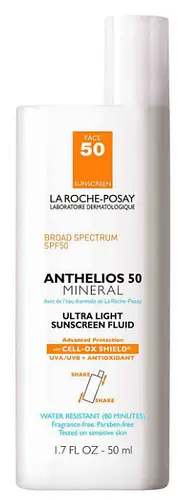Vanicream Sunscreen Broad Spectrum SPF 50+ Versus La Roche-Posay Anthelios 50 Mineral Ultra-Light Sunscreen
Updated on September 10, 2025
Overview
What they are
These products are both sunscreens. They have a total of 2 ingredients in common
Suited For
They're both likely to be good for dry skin and scar healing
Free From
They both do not contain any harsh alcohols, common allergens, oils, parabens or sulfates
What's Inside
They both contain silicones
We independently verify ingredients, and our claims are backed by peer-reviewed research. Spot a product that needs an update? Let us know.
Ingredient Info
Vanicream Sunscreen Broad Spectrum SPF 50+ 22 ingredients
La Roche-Posay Anthelios 50 Mineral Ultra-Light Sunscreen 35 ingredients
What's inside
What's inside
At a glance
Click on any of the items below to learn more
Vanicream Sunscreen Broad Spectrum SPF 50+ 22 ingredients
La Roche-Posay Anthelios 50 Mineral Ultra-Light Sunscreen 35 ingredients
Key Ingredients
Benefits
Concerns
Ingredients Side-by-side
Ingredients Explained
These ingredients are found in both products.
Ingredients higher up in an ingredient list are typically present in a larger amount.
Butyloctyl Salicylate is a chemical UV filter structurally similar to octisalate. It is a photostabilizer, SPF booster, emollient and solvent. This ingredient helps evenly spread out ingredients.
According to a manufacturer, it is suitable for pairing with micro Titanium Dioxide, Zinc Oxide, and pigments.
Photostabilizers help stabilize UV-filters and prevents them from degrading quickly.
Learn more about Butyloctyl SalicylateCaprylyl Glycol is a humectant and emollient, meaning it attracts and preserves moisture.
It is a common ingredient in many products, especially those designed to hydrate skin. The primary benefits are retaining moisture, skin softening, and promoting a healthy skin barrier.
Though Caprylyl Glycol is an alcohol derived from fatty acids, it is not the kind that can dry out skin.
This ingredient is also used as a preservative to extend the life of products. It has slight antimicrobial properties.
Learn more about Caprylyl GlycolIngredient Ratings
Here's what our community thinks of the ingredients in these products.
When to use
Vanicream Sunscreen Broad Spectrum SPF 50+ 22 ingredients
La Roche-Posay Anthelios 50 Mineral Ultra-Light Sunscreen 35 ingredients


